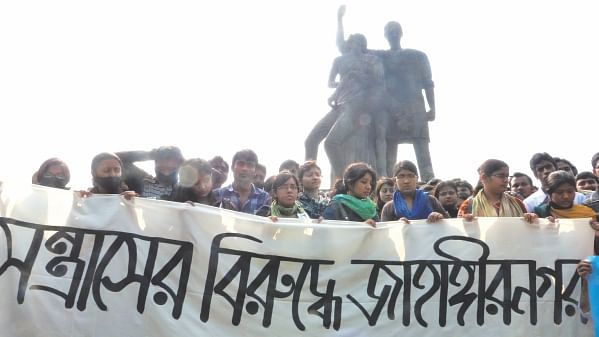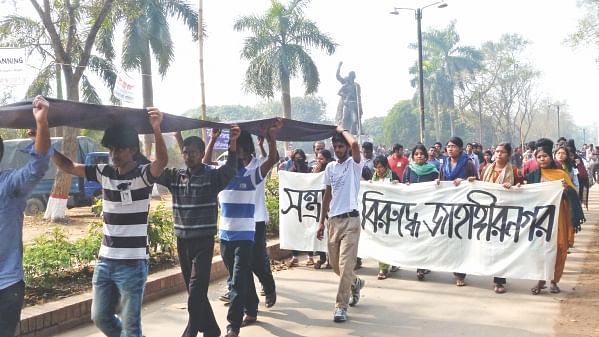| Home - Back Issues - The Team - Contact Us |
 |
| Volume 11 |Issue 03| January 20, 2012 | |
|
|
Follow-up Death in the Ivory Tower Akram Hosen Mamun
With its vast green fields, evergreen shrubs, woods and water bodies, Jahangirnagar University (JU) has one of the most beautiful campuses in the country. The only residential university of the country, JU could have been recognised as a centre of excellence in research, teaching and cultural activities. But such aspirations have been marred by organised and violent crimes consequences of rivalry between student cadres. The latest one is last week's murder of a graduating student Zubair Ahmed. It is a reminder of the history of JU in the last couple of decades, ridden with revenge killings, students being flung from rooftops, armed clashes and rapes. But none of the rapists and murderers were ever brought to justice. This picturesque campus has always been the perfect place for political gangsters to fight their vendetta, a gangland where activists and leaders of the ruling party are beyond the reach of justice. “It's as if the administration has sucked up the cases of murders; the unresolved cases are lost forever in the administrative black hole,” observes Raihan Rain, a teacher of the Department of Philosophy, JU. From their experiences, many of the university's former students and teachers are apprehensive that the killers of Zubair will also go scot-free. Moreover, it is becoming obvious that the faction of Bangladesh Chhatra League (BCL) that killed Zubair had the blessings and patronage of the administration. Which may explain why the VC expelled only three students even though at least 10 people were involved in beating up Zubair to death that evening. Rain comments that the VC Shariff Enamul Kabir himself controls groups of cadres in the campus; he decides whether a group can stay on the campus or be ousted. As a result, these killers do not only have the advantage of being a part of the ruling party but they also have the patronage of the administration.
BCL activist Mozammel, not his real name, discloses that the Vice-Chancellor drove “a large number of Chhatra League members away from the campus.” Since the university's dormitories, dining and management are usually controlled by activists of the ruling party, the VC empowered and indeed endowed a faction of BCL with these 'responsibilities'. Unfortunately, Zubair “belonged to a faction of the BCL that didn't have the 'blessing' of the VC. That's why he had to leave the dormitory more than a year ago, and I think that he should have seen something coming as he entered the campus to sit for the last examination of his life,” says Mozammel. “A faction of the BCL called the VC group has the power to beat up any student and do almost anything they want to in the campus. As a result, more students want to be a part of that group. Protesting is out of question because this VC even fires academics who express their disagreement with his policies,” he adds. Another student of the Department of English says, “Many of our valued teachers have left the university because they could not stand by and watch this VC shamelessly recruit his favourite candidates in the academia and the administration. We do not raise our voice against them because we live in constant fear.” Shamsad Mortuza, a former chair of the department of English could not but agree: “In the last few years, nepotism has been an open secret in Jahangirnagar University. More than a hundred teachers were recruited on the basis of their political affiliation. Even a larger number of administrative officials and staffs were recruited as personal favours.” Many of the students including the Chhatra League activists assert that the VC only prefers those who are from Gopalganj, the PM's home district. “According to him, he and the Prime Minister both are from the same village,” says another teacher who does not want to disclose his name.
Since the establishment of democracy in the country in 1991, criminal activities of the ruling parties in the university have reached a new height. In the late 90s, BCL cadre Manik became infamous for raping female students in the campus. Former students of the university remember how Manik and his gang beat up students who protested their crimes. “The current events are a continuation of the past,” says Mahbub Iran, a former student who went to the campus after Zubair's death to participate in demonstrations against criminal activities in the campus. “From the security in-charge to the administrative officials to the minor staffs, every new recruit is a former cadre of the BCL. We know them. The thugs we knew when we were in the campus have now become the security in charge and administrative officers.” However, the students of the university have always organised mass movements to protest these criminalities. In the face of oppression and threats from the administration, in the late 90s, thousands of students demonstrated against the campus rapes and ousted BCL cadre Manik and his gang from the university. After Zubair's death, the whole campus has again erupted in protests. Under the banner of "JU against terrorism", about 2,000 students have held protests with their four-point demands. They include punishment of the proctor and other members of the proctor-ial body for its failure to ensure students' safety, and the formation of a new committee to probe Zubair's death, which is going to submit its report in a week. They are also demanding a full fledged medical centre with an efficient ambulance service on campus. A large number of the teachers who are against the tyranny and concentrations of power have joined the protesting students. They have demonstrated in front of the vice chancellor's office. Prof Arzu Miah, Proctor of the university, has already resigned from his post in the face of growing demand for his removal. The agitating teachers have withdrawn their class boycott, but are demanding the resignation of the whole proctorial body, assurance of a congenial environment for all political parties and removal of ineligible teachers appointed during the last three years. Asked for his comment, Prof Arzu Miah says, “Vice Chancellor is the chief of the organisation. All the students are his students and all the executive hands work for him, so there can't be any pro or anti VC group. There's no such thing.” He did not give any reason for his resignation, nor did he comment on the protests against him. Despite repeated attempts, the VC could not be reached. Popular movements never fail to bring about a positive change. The three accused students, who were expelled from the university for only one year, have been expelled for life and arrested now. The security in-charge has also been transferred. “Regardless of their political affiliations, students have joined us in their hundreds to express their solidarity. These protests are crucial to create pressure on the administration to clean the campus of violent political gangsterism,” says Joydip, a student organiser of the movements. Copyright
(R) thedailystar.net 2012 |


